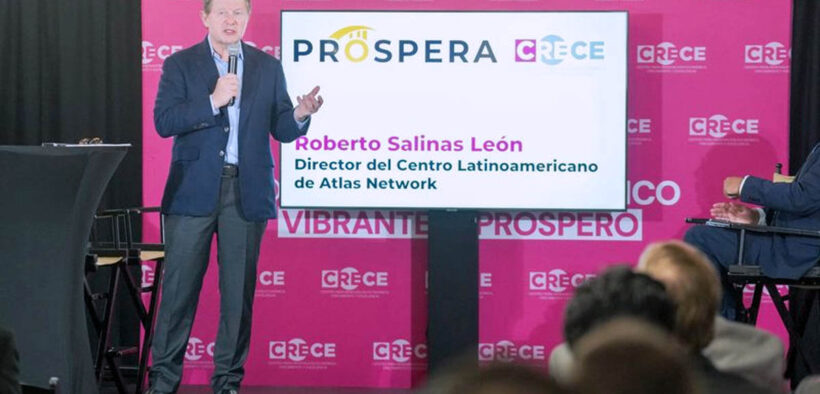Salinas: Slash taxes, red tape to grow Puerto Rico’s economy

Puerto Rico must “embrace deeper economic freedom, simpler regulation and a more focused state role” to unlock inclusive prosperity, because excessive bureaucracy and distortionary taxes are stifling innovation and productivity, economist Roberto Salinas said during a forum hosted by the Center for Economic Renewal, Growth and Excellence (Centro CRECE).
Salinas, director of international affairs at the University of Liberty in Mexico City and president of the Alamos Alliance economic colloquium, called his visit “a happy return home since 1991,” acknowledging CRECE Executive Director Tere Nolla and founder and former Gov. Luis Fortuño for the invitation.
He framed his remarks around a central question: what conditions generate broad-based prosperity, beyond good intentions in economic policy.
Salinas — who has published more than 2,000 articles and given more than 1,000 lectures worldwide — stressed that economic freedom is not an abstract concept reserved for academics but grounded in everyday decisions by families and workers.
“The housewife, the informal worker, the taxi driver, are usually the greatest repositories of economic knowledge,” he said, because they know “what it means to tighten their belts, to do more with less in less time.”
That is why, he argued, it is “much better to empower families, mothers and individuals with these resources, rather than with dependency programs,” which he described as “what Octavio Paz in Mexico called the philanthropic ogre.”
During his keynote speech, Salinas outlined five pillars of economic freedom, beginning with sound money.
A stable currency that preserves purchasing power, he said, is “absolutely fundamental to economic freedom, because money is the resource that matters at the end of the day.” Price stability allows people and businesses to plan long term, calculate returns and invest with confidence, he added.
He then turned to the legal and regulatory environment, warning that “4,500 bureaucratic procedures” and dense rulebooks create opportunities for corruption. In many countries, he said, countless laws are “practically designed for extortion,” turning bribes into an “extra-legal tax to prosper.”
Instead of trying to fight corruption in isolation, he argued, governments should remove the incentives by simplifying rules: “Of course, we need regulation, of course, we need laws, but they should be simple and straightforward so that individuals can face the enormous challenges we face.”
Trade freedom, he said, is another cornerstone. Salinas described commerce as “a free and voluntary exchange between two, 200, 2,000 or 2 billion people,” whether in formal markets or informal street stalls.
In that context, he rejected zero-sum views of trade: “In free and voluntary exchange, one party only wins if the other party wins,” he said, adding that trade is fundamentally “between people, some of whom live in different countries.”
Above all, he argued, prosperity depends on the rule of law and secure property rights.
“What’s mine is mine, it’s not yours, it’s not someone else’s,” he said. “By what right can you take it from me?”
A functioning legal system, he added, should “facilitate, not hinder, development,” making it easier, not harder, to invest, innovate and create jobs.
Salinas, a senior fellow for Latin America at Atlas Network, said prosperity also depends on investment in infrastructure and human capital, along with the ability to adopt new technologies.
He cited a concise diagnosis from a Mexican economist: the causes of low growth lie in “insufficient investment in physical and human capital,” a “slow absorption of new technologies” and “an inadequate institutional structure that inhibits economic agents from capturing their full global potential.”
Tax policy, he added, must be seen through the lens of incentives and productivity. The state should “not take what’s mine except what you need to guarantee contracts, to guarantee public safety,” and social safety nets should be “intelligent and not create a [gigantic] state that ends up suffocating you.”
Social support, he insisted, is delivered more effectively “by letting people work, letting them prosper, and facilitating investment than through handouts, dependencies, and through the philanthropic ogre.”
In closing, Salinas urged Puerto Rico to study past success stories to design its own path forward. If societies fail to learn from the conditions that enabled progress elsewhere, he warned, “we will hardly understand what we require to be able to progress and prosper.”




